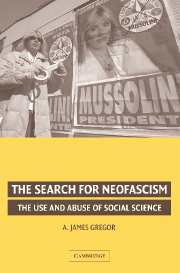Book contents
- Frontmatter
- Contents
- Preface
- Acknowledgments
- 1 The Decay of an Enterprise
- 2 Fascism
- 3 Neofascism: Some Presumptive Candidates
- 4 Julius Evola, Fascism, and Neofascism
- 5 Black Nationalism and Neofascism: Marcus Garvey and the Universal Negro Improvement Association
- 6 Black Nationalism and Neofascism: Elijah Muhammad and the Lost-Found Nation of Islam
- 7 Islamofascism: Neofascism in the Middle East
- 8 Hindutva: The Case for a Saffron Fascism
- 9 Post-Maoist China: Fascism with Chinese Characteristics
- 10 Conclusions
- Index
10 - Conclusions
Published online by Cambridge University Press: 05 June 2012
- Frontmatter
- Contents
- Preface
- Acknowledgments
- 1 The Decay of an Enterprise
- 2 Fascism
- 3 Neofascism: Some Presumptive Candidates
- 4 Julius Evola, Fascism, and Neofascism
- 5 Black Nationalism and Neofascism: Marcus Garvey and the Universal Negro Improvement Association
- 6 Black Nationalism and Neofascism: Elijah Muhammad and the Lost-Found Nation of Islam
- 7 Islamofascism: Neofascism in the Middle East
- 8 Hindutva: The Case for a Saffron Fascism
- 9 Post-Maoist China: Fascism with Chinese Characteristics
- 10 Conclusions
- Index
Summary
There are many reasons why so many academics have spent so much time in the search for neofascism. For some it simply involved a pursuit of an old enemy. Their number includes all those proper thinkers who as liberals and democrats have made it their purpose to expose all who would violate the civil and human rights of others. It includes all those who still suffer the memory of the mass murders done for political reasons – and who seek to foreclose any possibility that such horrors might befall humanity again. All of these reasons are entirely understandable and commendable. The difficulty is that the focus of such inquiry is much too narrow. If the object of the enterprise is to identify those forces responsible for the carnage and violation of human rights that have darkened the twentieth century, limiting our scrutiny to Fascism, generic fascism, or neofascism would hardly serve the purpose.
Commencing with the Armenian genocide at the turn of the century, the entire twentieth century has witnessed the mass murder of innocents at the hands of a variety of revolutionary governments, all attended by grievous violation of civil and political rights. Neither Mussolini's Fascism, generic fascism, nor neofascism could possibly be made responsible for all that.
If the motive behind the search for neofascism is the desire to preclude the advent of antidemocratic, antiliberal, and xenophobic political forces in the modern world, the scope remains too narrow, for even the nonexistence of Mussolini's, or Hitler's, regimes would have neither saved the lives of millions upon millions of innocents lost in our time nor preserved democracy.
- Type
- Chapter
- Information
- The Search for NeofascismThe Use and Abuse of Social Science, pp. 256 - 280Publisher: Cambridge University PressPrint publication year: 2006



